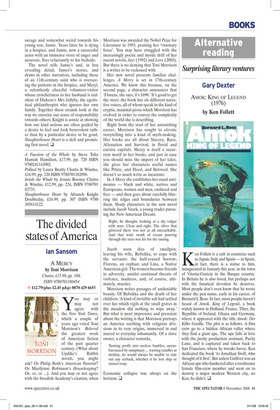The divided states of America
Ian Sansom
A MERCY by Toni Morrison Chatto, £15.99, pp. 168, ISBN 9780701180454 V £12.79(plus £2.45 p&p) 0870 429 6655 You may or may not agree with the New York Times, which a couple of years ago voted Toni Morrison’s Beloved the greatest work of American fiction of the past quarter century. (What about Updike’s Rabbit novels, you might ask? Or Philip Roth’s American Pastoral? Or Marilynne Robinson’s Housekeeping? Or, or, or ...). And you may or not agree with the Swedish Academy’s citation, when Morrison was awarded the Nobel Prize for Literature in 1993, praising her ‘visionary force’. You may have struggled with the increasingly poetic and mystic drift of her recent novels, Jazz (1992) and Love (2003). But there is no denying that Toni Morrison is a writer to be reckoned with.
Her new novel presents familiar challenges. A Mercy is set in 17th-century America. We know this because, on the second page, a character announces that ‘Florens, she says, it’s 1690.’ It’s good to get the steer: the book has six different narrative voices, all of whom speak in the kind of cryptic, maximal prose which Morrison has evolved in order to convey the complexity of the world she is describing.
Right from the start of her astonishing career, Morrison has sought to elevate storytelling into a kind of myth-making. Her books are all about Slavery, Race, Alienation and Survival, in florid and cursive capitals. Mercy is itself a recurrent motif in her books, and just in case you should miss the import of her tales, she gives her characters useful names like Pilate, and Heed, and Beloved. She doesn’t so much write as incantate.
In A Mercy she establishes her usual antimonies — black and white, natives and Europeans, women and men, enslaved and free — and then goes about carefully blurring the edges and boundaries between them. Shady characters in the new novel include Jacob Vaark, a young trader pursuing the New American Dream.
Right, he thought, looking at a sky vulgar with stars. Clear and right. The silver that glittered there was not at all unreachable. And that wide swath of cream pouring through the stars was his for the tasting.
Jacob soon dies of smallpox, leaving his wife, Rebekka, to cope with the servants: the half-crazed Sorrow; Florens, an orphan; and Lina, a Native American girl. The women become friends in adversity, amidst continual threats of violence, madness, and, of course, ultimately, murder.
Morrison writes passages of undeniable beauty. Of Rebekka and the death of her children: ‘A kind of invisible ash had settled over her which vigils at the small graves in the meadow did nothing to wipe away.’ But what is most impressive and prescient about the writing is that Morrison portrays an America seething with religious divisions in its very origins, immersed in and inured to everyday inhumanity. Of a slave owner, a character remarks,
Turning profit into useless baubles, unembarrassed by sumptuary ... wasting candles at midday, he would always be unable to ride out any setback, whether it be lost ship or ruined crop.
Economic collapse was always on the horizon. ❑


















































































 Previous page
Previous page